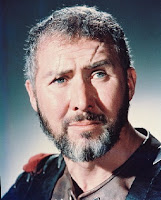This is coolbert:
"we will stand - - and hold!!"
Here from a movie review [?], the author confusing the various cinematic masterpieces, Fall of the Roman Empire, Spartacus, and Gladiator.
"VERULUS, GLADIATOR AND FATHER"
"Of all the characters in Fall of the Roman Empire, it is the story of Verulus (Anthony Quayle), which plays out quietly in the background, that fascinates me most."
The "commander" of the gladiator combat contingent, Verulus, as played by Anthony Quayle. Anthony a man MOST SUITED to play a warrior and combatant, Anthony having served most nobly in the Second World War, as a partisan fighter in Albania, and an officer who would have served in the same capacity if and when England had been invaded by the German!
"Some gladiators were volunteers (mostly freedmen or very low classes of freeborn men) who chose to take on the status of a slave for the monetary rewards or the fame and excitement [the "rush"]. Anyone who became a gladiator was automatically infamis, beneath the law and by definition not a respectable citizen."
This is not necessarily so. Some Romans, seeking adventure more than anything else, became gladiators, enjoying the "occupation", the fight and the kill, the blood, and evidently did so with relish. To include - - the brother of the famous Mark Antony!
According to John Keegan:
"there were volunteers as well as slaves in the ranks of the gladiators. And not all of them social refugees: Mark Antony's brother Lucius fought as a gladiator in Asia Minor."
"the gladiators are tough and good killers, they have not had the type of military training that enables to regular military to work together as team."
". . . military training is about building group cohesion and loyalty while gladiator training is about creating an entertaining killer who has no loyalty to anything but staying alive."
The SOLDIER as compared to the WARRIOR. The SOLDIER fighting as part of a team, not as an individual, the SOLDIER fighting according to a plan and not in a helter-skelter manner, the SOLDIER accepting willingly discipline and comporting himself to same.
The gladiator regiment as commanded by Verulus taking off in mass panic when the Germanii attack, the inability of the gladiators to fight as a TEAM being most self-evident!
"Verulus also probably did not feel comfortable talking back to people who outranked him so much. As a slave or other lowly person, he would have been in the habit of keeping his mouth shut."
NO, NOT SO! Verulus did have a haughty manner about him and this was also highly merited. Verulus had fought and survived many battles in the area and in contrast to the majority of his comrades who DID cut and run when in combat with the Germanii, Verulus stood his ground and did fight well! Verulus did speak to those of higher station than himself with authority and a marked degree of confidence!
The author confuses [?] Verulus with the EVIL Marcellus of Spartacus. Marcellus also a very adept gladiator, proficient at killing and also a veteran of the arena, having won his freedom by killing a whole host of opponents. Marcellus is a villain you love to hate, par excellence, his death at the hands of Spartacus well deserved, without question justice! [Marcellus as shown in the movie drowned in a vat of soup!]
The author also has the periods confused? The events as shown in the movie Spartacus occurred around 71 B.C. or so, the events as shown in the movies Fall of the Roman Empire and Gladiator during the time of the Emperor Marcus Aurelius [d. 180 A.D.]!
"uri, uinciri, uerberari, ferroque necari"
coolbert.

No comments:
Post a Comment